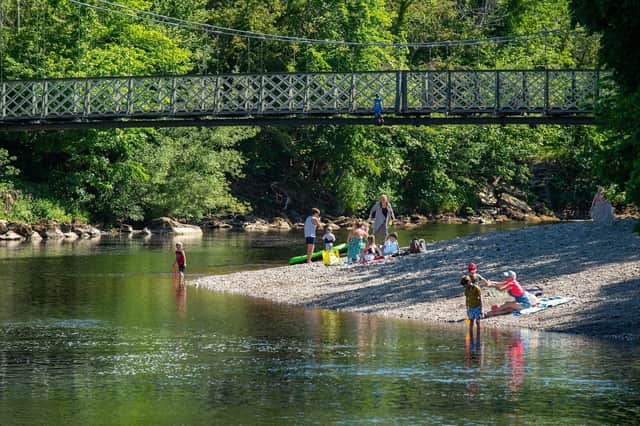River Wharfe sewage problem shows water should not be in private hands - Jon Trickett MP


The Wharfe has carved a majestic dale crowned by the beautiful towns of Otley and Ilkley. These were our destinations. They felt like a different world to the terraced housing where we lived.
Otley and Ilkely both had outdoor swimming pools. The Ilkley pool always felt particularly cold to me. But next to the Ilkley Lido was the River Wharfe. And just there the river slowed down and broadened with a beach. You could swim there for free. This was our idyllic location.
Advertisement
Hide AdAdvertisement
Hide AdI have often gone back, even cycled there to that same spot for a bit of wild swimming or just to breathe the fresh air. I was there in August this year.
Over the years thousands of people from all over West Yorkshire and further afield have been to this very spot. In 2020 the Department for the Environment, Food and Rural Affairs designated the area the first bathing spot on a British river anywhere in the country.
How can it be then, that the Environment Agency has just declared that this very area has high concentrations of faecal bacteria?
The answer, according to The Times newspaper quoting local campaigners, in part seems to be “a result of rainfall overwhelming a sewage pumping station, run by Yorkshire Water, causing it to spill untreated effluent into the river”.
Advertisement
Hide AdAdvertisement
Hide AdLast year The Times reported that in a 12-month period a treatment works in Ilkley had spilt a blend of rainwater and untreated waste into the River Wharfe for 2,200 hours.
Let’s be very blunt. When the supply of clean water to our homes and the protection of our river courses was handed over to the private sector, we lost something special.
This is because common ownership of these functions – which are vital to life itself – ceased to be governed by the single ethic of public service and public health.
It will be argued that the Environment Agency is meant to regulate the water giants, but the Agency is under-resourced and lacking in powers.
Advertisement
Hide AdAdvertisement
Hide AdThe truth is that the ethic of profit maximisation is what drives the water companies. Yorkshire Water is a private company. It provides water supply to customers in West Yorkshire, South Yorkshire, the East Riding of Yorkshire, part of North Lincolnshire, most of North Yorkshire and part of Derbyshire.
According to We Own It, they waste an incredible 295.2 million litres of water per day because of lack of investment.
When it comes to pollution the EA has several levels for measuring the severity of an incident. The most serious incidents are logged as category one and two. The BBC reported that overall Yorkshire saw 48 such incidents in the reporting period from 2020 to 2021, an increase from 41 in the previous year.
A category one incident has a ‘major effect’ on either water quality, human health, conservation or businesses, while category two has a ‘significant effect’. Despite this, shareholders took £412m in profits between 2013 and 2017.
Advertisement
Hide AdAdvertisement
Hide AdYorkshire Water is ultimately owned through a complex series of holding companies by Kelda Holdings. Kelda is not registered in Yorkshire, as you might think. It is registered in Jersey.
Yet the private water companies hold a lot of influence in Westminster. Through political donations they seek to secure support for privatisation. The Kelda Group donated to Labour between 2003 and 2008 when Tony Blair was Prime Minister. Yorkshire Water made four donations to the Conservative Party between 2010 and 2013. Water companies who run essential public services shouldn’t be donating our money to political parties.
The countryside and our waterways are a ‘natural treasury’ for all our people. It is not right that they have been hived off to private entities which have no roots in the area they serve and that their primary drive is shareholder value and perhaps tax avoidance.
According to polls, there is wide-scale support for public ownership of water. Labour’s leadership needs to think carefully about their ideological opposition to public ownership of precious natural assets. Water is a classic case for removing the profiteers. Their environmental record is poor, but their greed is legendary.
Jon Trickett is Labour MP for Hemsworth.
Comment Guidelines
National World encourages reader discussion on our stories. User feedback, insights and back-and-forth exchanges add a rich layer of context to reporting. Please review our Community Guidelines before commenting.